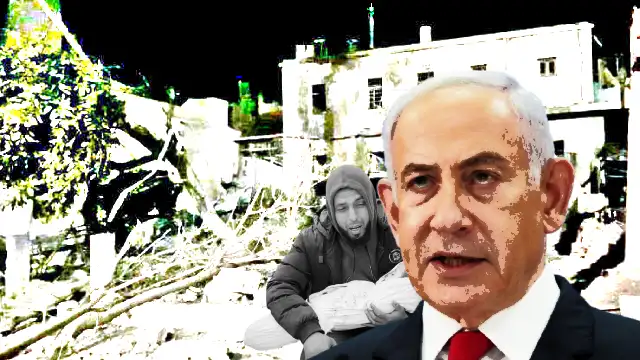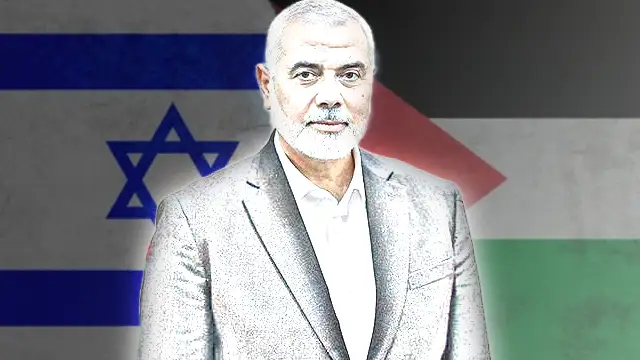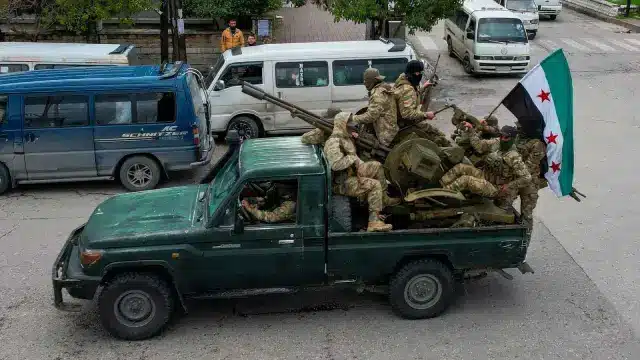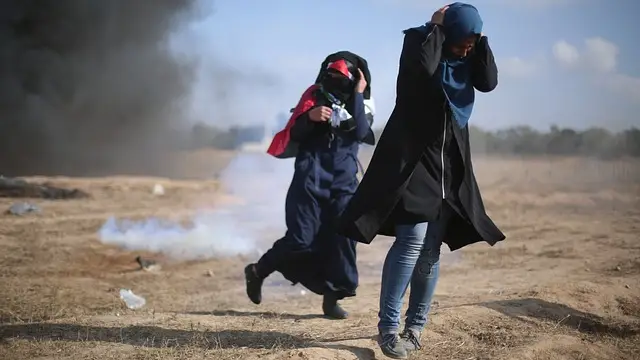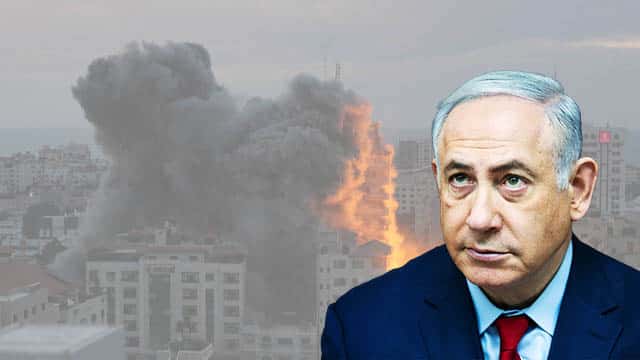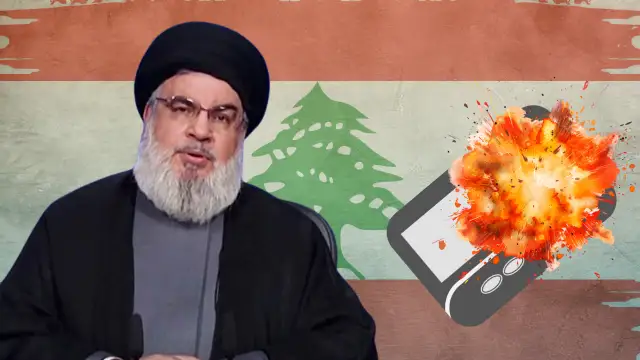In the early hours of April 13th, Israeli forces bombed Al-Maamadani Hospital (also known as the Baptist Hospital) in central Gaza City, destroying its two-storey Genetic Laboratory and damaging the Pharmacy and Emergency Department. Israel’s attack on Gaza’s Baptist Hospital came just 20 minutes after Israeli authorities issued an evacuation order, forcing patients—many critically ill and on oxygen—into the streets with nowhere to go.
Israeli media, quoting the Israel Defense Forces (IDF), claimed that the attack targeted a “Hamas command centre” inside the hospital and that the authorities have taken precautions to minimise losses of innocent lives by using precision munitions and warning systems.
With Israel’s attack on Gaza’s Baptist Hospital and its destruction, the northern part of the strip lost its last functioning medical facility after Israel’s total destruction of the healthcare infrastructure in the region.
Israel’s attack on Gaza’s Baptist Hospital has drawn fierce condemnation from Palestinian resistance organisations and sparked outrage among international observers.
How has Gaza’s healthcare system become a primary target in this conflict?
And what does this latest destruction mean for the 2.3m people trapped in the strip?
Israel’s attack on Gaza’s Baptist Hospital: Not the first one
The Baptist Church in Jerusalem expressed its dismay, noting this was the fifth time Al-Maamadani had been bombed since the beginning of the war in October 2023. “The Diocese of Jerusalem is appalled at the bombing of the hospital now for the fifth time since the beginning of the war in 2023 – and this time on the morning of Palm Sunday and the beginning of Holy Week,” the church said in a statement.
The Anglican-run hospital had previously been the site of one of the most devastating incidents of the war. In October 2023, an explosion in the hospital’s courtyard killed more than 500 people, including patients and displaced civilians who had sought refuge there.
Israel claimed the blast resulted from a failed rocket launched by Palestinian Islamic Jihad—an assertion Palestinian resistance groups have consistently denied as propaganda meant to “cover Zionist war crimes.”
Israel’s attack on Gaza’s Baptist Hospital on Sunday has left critically ill patients without essential care.
According to Al Jazeera, IDF’s bombing forced out “critically ill patients, including those in the surgical and emergency units,” leaving them “without shelter or oxygen.”
Razan al-Nahhas, an emergency doctor who previously worked at Al-Ahli Hospital, told the network that at least three patients, including a 12-year-old boy with a head injury, died during the forced evacuation.
“He was on oxygen, as were the two other patients, and the family basically walked with them to a nearby hospital, a very small facility with no capacity for the number of patients heading their way. And they [the patients] arrived dead,” Dr al-Nahhas, from Deir el-Balah in central Gaza, was quoted by Al Jazeera.
Israel’s attack on Gaza’s Baptist Hospital also damaged surrounding buildings, including St Philip’s church, according to the Baptist Church’s statement from Jerusalem.
Critics say the Anglican church’s reluctance to sue IDF after the first attack on the hospital in October 2023 has emboldened the latter and made the latest attack inevitable.
Resistance groups condemn Israel’s attack on Gaza’s Baptist Hospital
Palestinian resistance organisations have forcefully condemned Israel’s attack on Gaza’s Baptist Hospital, characterising it as part of a systematic campaign to destroy Gaza’s healthcare infrastructure.
Hamas issued a statement questioning the international community’s silence. “How can the world—especially its political and legal institutions, led by the UN Security Council—remain silent in the face of these unprecedented crimes in modern times, which include bombing hospitals, committing massacres within them, and brutalising and displacing patients and the wounded into the streets?” the group asked.
Hamas placed responsibility for the attack squarely on the United States, which continues to supply Israel with weapons and diplomatic support despite mounting civilian casualties.
Palestinian factions described the bombing as “a deliberate and brutal war crime” that took place “in the dead of night” after Israel “threatened the patients and displaced civilians inside.”
They emphasised that this was “not an isolated act, but part of a systematic genocide campaign” that specifically targets “hospitals, schools, shelters, and refugee tents in an effort to destroy life in Gaza and forcibly displace its people.”
Hezbollah, the Lebanese resistance movement, also weighed in, calling the bombing “a flagrant war crime” that “once again confirms the brutal criminal nature of the Zionist enemy, which does not hesitate to commit the most heinous crimes under pretexts and lies, completely disregarding all humanitarian and international laws.”
The group described Israel’s attack on Gaza’s Baptist Hospital as “an extension of the ongoing genocide war waged by the Zionist killing machine against the steadfast Palestinian people” and “a brutal crime in the context of the systematic destruction of the remaining foundations of life in the besieged Gaza Strip, with unlimited American complicity and support.”
Meanwhile, Israel continues to allege that the Palestinian resistance organisation Hamas has been using hospitals for their covert operations against the IDF.
Part of a broader pattern of violence
The destruction of Al-Maamadani Hospital did not occur in isolation. It came amid intensified Israeli bombardments across the Gaza Strip, with Palestinian resistance sources reporting numerous deadly attacks on April 12th and 13th.
These included a major massacre west of Deir Al-Balah that killed seven people, including six brothers from the Abu Mahadi family; the bombing of the Deir Al-Balah Municipality building, which left three dead; an attack on the Sharab family in Khan Younis that killed three; and a strike on the Manoun family home in Jabalia that resulted in six fatalities.
From 10pm on April 12th through 7pm on April 13th, Israeli forces carried out continuous bombardments across Gaza, targeting residential areas, tents housing displaced people, and civilian infrastructure.
The resistance sources documented extensive shelling and airstrikes in Gaza City, Khan Younis, Deir al-Balah, Jabalia, Nusseirat, Beit Lahia, and Rafah.
According to these sources, at least 35 Palestinians were killed in the 24-hour period.
The Palestinian Ministry of Health in Gaza reported that 11 people were killed and 111 injured in the day’s attacks, noting that “a number of victims remain under the rubble and on the roads, unable to be reached by ambulance and civil defence crews.”
The ministry added that since March 18th 2025, 1,574 Palestinians have been killed and 4,115 wounded. The overall death toll since October 7th 2023 has now reached 50,944, with 116,156 injured.
Calls for international action
Palestinian resistance organisations have called for immediate international intervention to halt the attacks on Gaza’s healthcare system and civilian population.
They urged the United Nations and human rights organisations to “intervene immediately” and called on “Arab and Islamic nations to fulfil their responsibilities.”
The groups also appealed to “free people around the world to rise up and apply pressure to stop this ongoing genocide.”
Hezbollah specifically called on “international and human rights organisations, as well as Arab and international medical and humanitarian bodies, to condemn this brutal aggression, take urgent action to protect civilians and healthcare facilities in Gaza, and take immediate action to stop the crime of genocide.”
The Baptist Church echoed these sentiments, saying: “We call upon all governments and people of goodwill to intervene to stop all kinds of attacks on medical and humanitarian institutions.”
As Gaza’s last major hospital lies in ruins, and with the death toll continuing to rise, the urgent question remains: what will it take for the international community to move beyond statements of concern and take concrete action to protect Palestinian civilians and essential infrastructure?
Israel’s attack on Gaza’s Baptist Hospital is a part of the systematic destruction of Gaza’s healthcare system, which represents not just a violation of international humanitarian law, but the elimination of the fundamental right to medical care for an entire population under siege.

